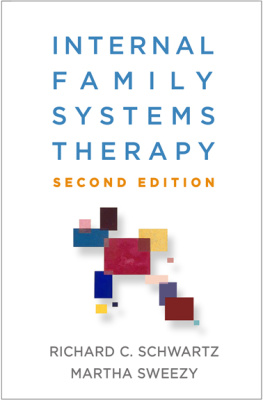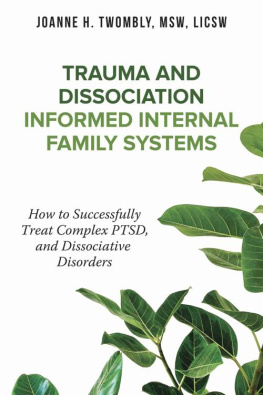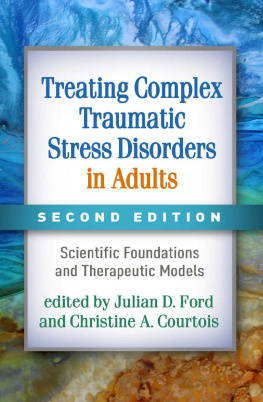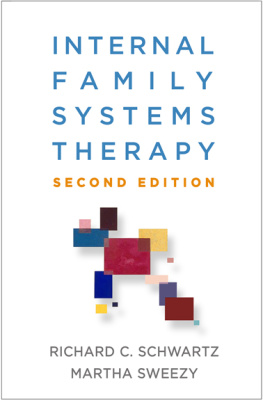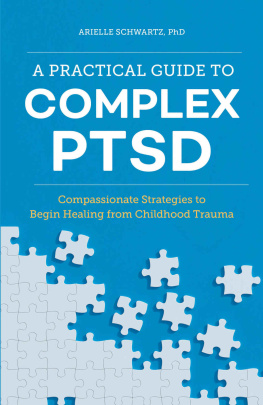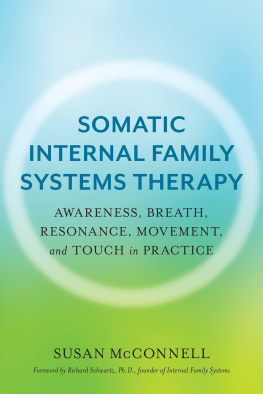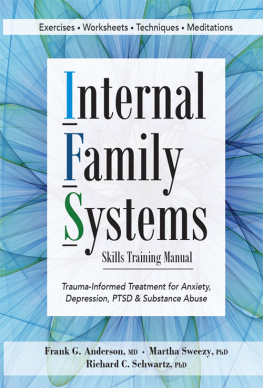Contents
Guide
List of Pages

The book title appears in the center. The edition number, second edition, appears below the title. The cover image shows rectangular boxes of various sizes and colors; Most of them overlap each other at their edges. The editors names, Richard C. Schwartz and Martha Sweezy, appear below the image.
Also Available
Handbook of Family Therapy Training and Supervision
Edited by Howard A. Liddle, Douglas C. Breunlin, and Richard C. Schwartz
INTERNAL FAMILY SYSTEMS THERAPY
SECOND EDITION

Richard C. Schwartz
Martha Sweezy

THE GUILFORD PRESS
New YorkLondon
EPUB Edition ISBN: 9781462541478; Kindle Edition ISBN: 9781462541492
Copyright 2020 The Guilford Press
A Division of Guilford Publications, Inc.
370 Seventh Avenue, Suite 1200, New York, NY 10001
www.guilford.com
All rights reserved
No part of this book may be reproduced, translated, stored in a retrieval system, or transmitted, in any form or by any means, electronic, mechanical, photocopying, microfilming, recording, or otherwise, without written permission from the publisher.
Last digit is print number:98765432
The authors have checked with sources believed to be reliable in their efforts to provide information that is complete and generally in accord with the standards of practice that are accepted at the time of publication. However, in view of the possibility of human error or changes in behavioral, mental health, or medical sciences, neither the authors, nor the editors and publisher, nor any other party who has been involved in the preparation or publication of this work warrants that the information contained herein is in every respect accurate or complete, and they are not responsible for any errors or omissions or the results obtained from the use of such information. Readers are encouraged to confirm the information contained in this book with other sources.
Library of Congress Cataloging-in-Publication Data
Names: Schwartz, Richard C., author. | Sweezy, Martha, author.
Title: Internal family systems therapy / Richard C. Schwartz, Martha Sweezy.
Description: Second edition. | New York : The Guilford Press, [2020] | Includes bibliographical references and index.
Identifiers: LCCN 2019014935 | ISBN 9781462541461 (hardcover)
Subjects: LCSH: Psychotherapy patientsFamily relationships. | Multiple personality. | Psychosynthesis. | FamiliesPsychological aspects. | Family psychotherapy.
Classification: LCC RC489.F33 S24 2020 | DDC 616.89/156dc23
LC record available at https://lccn.loc.gov/2019014935
This second edition is dedicated to my father, the late Ted Schwartz, who taught me to follow the data even if they lead far outside my paradigm, and the late Doug Sprenkle, who was a great mentor and supporter.
R.C. S.
I dedicate my efforts in this book to the therapists, counselors, coaches, meditators, mediators, educators, lawyers, businesspeople, organizers, physicians, spiritual seekers, scientists, farmers, environmentalists, researchers, tree planters, artists, and citizens who are implementing IFS personally and professionally all over the world.
M. S.
About the Authors
Richard C. Schwartz, PhD, the developer of the Internal Family Systems (IFS) model, is on the adjunct faculty of the Department of Psychiatry at Harvard Medical School. He has devoted his career to evolving and disseminating IFS, which now is being taught all over the world. Dr. Schwartz founded the IFS Institute in Oak Park, Illinois, which coordinates IFS trainings in the United States and internationally. He is a featured speaker at many national conferences and has published more than 50 articles and books about IFS and other psychotherapy topics. His website is https://IFS-institute.com.
Martha Sweezy, PhD, is Assistant Professor at Harvard Medical School, part-time; Program Consultant and Supervisor at Cambridge Health Alliance; and former Assistant Director and Director of Training for the Dialectical Behavior Therapy Program at Cambridge Health Alliance. She has a therapy and consultation practice in Northampton, Massachusetts, and has a particular interest in how shame and guilt affect human behavior. Dr. Sweezy has published several articles and books on IFS therapy.
Preface
The family therapy movement, which viewed extreme individual behaviors in the context of a larger system, liberated the field of mental health to focus on context and relationships. Internal Family Systems (IFS) takes this perspective further by viewing the psyche as a relational milieu that is populated by independent entities. IFS guides us to be curious about the motives and interactions of this inner populace, who have their own stories to tell.
These inner entities, which I (RCS) designated , are altruistic and their behavior is motivated rather than random. Their intentions for the internal system are positive. As I learned when I queried the inner systems of young, eating-disordered women, when one part gets hurt others typically take on protective roles and make sacrifices for the system as a whole. These protective parts feel gratified when we acknowledge their sacrifices, and palpably relieved when we address their concerns. But an attitude of acceptance and gratitude toward extreme protectors is not intuitive for those of us who are strongly influenced by Western culture. In the novel Night Secrets (1990), Thomas Cooks hero describes his experience of an inner critic:
He could feel the evil bubble growing in him, the one that made everything a little emptier than it already was. It drifted toward him from out of nowhere now, as if it no longer needed to be called up by any particular thing, but simply occupied its place as a steadily darkening presence, filling him with hissing accusations about the way hed lived his life. There were times when he suspected that everyone must have such a specter, but then hed see a couple laughing in a restaurant or a father playing with his daughter in the park, or even some solitary old woman contentedly reading a newspaper on her bare cement stoop, and they would strike him as people whod somehow escaped the grasp of a merciless pursuer, had closed the door and thrown the bolt just in time to leave the shadow breathless in the hall. (pp. 161162)
This character views his critic as a mysterious, sinister force that is harsh and out of control. However, as we illustrate throughout this book, even relentlessly harsh protectors are engaging in self-sacrifice. Cooks hero was subjected to an inner critic who, if we were to interview it, would say it just wanted to protect him (i.e., the vulnerable young part it protects). If we asked how it was protecting him, it might say it was trying to shame him into mending his ways and improving so he would be safe from external criticism in the future; or, it might say it was trying to run down his confidence so he wouldnt take risks and get hurt. Finally, if we were to ask this critic if it saw the irony in trying to shame someone to save them from being shamed, it would blink in surprise and be stumpedbecause it would be almost as young as the part it was trying to protect.
Although harsh critics aim to serve the clients safety by controlling and inhibiting, they invariably spark resistance in other protectors who counterbalance inhibition with disinhibited behaviors like bingeing, drinking, cutting, and suicide. Although the subsequent clashes between proactive inhibitors and reactive disinhibitors can wreak havoc in an individuals life, they are quite effective at keeping injured partsthe heart of a clients vulnerabilityout of sight and mind. Bulimic clients are a good example of this dynamic. Their inner life is characterized by a relationship between inner critics who scrutinize weight and appearance in threatening ways, and reactive counterparts who push for indulgence (Catanzaro, 2016). If we take this critic out of context, we might easily believe it represents a parts essential nature or is simply the internalization of a critical parentjust as we might believe that a bulimic teen simply has an eating disorder if we consider her in isolation, outside the context of her family system. But if we ask the part why it criticizes the client, it will say it fears a calamitous outcome if it were to stop: She would binge-eat, gain weight, and be even more unlovable; her rage would alienate her family; she would be overcome with sadness, stay in bed, and be all alone. In this context, brutal inner criticisms have a clear rationale. The critic is trying to manage an underlying threat that others may not see. The only credible offer of help is one that can resolve this threat. As we illustrate in this book, IFS guides us to offer deep understanding and credible help to the critic and the innumerable other parts who populate our clients inner worlds, some of whom long to transform but are stuck in extreme, destructive roles.

